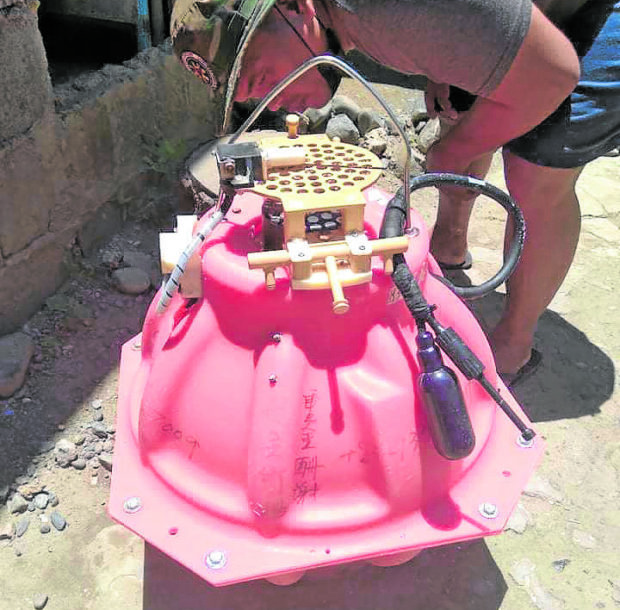Expert: Beijing may be illegally surveying WPS

UNUSUAL FIND Fishermen found an ocean bottom seismometer, or OBS, in a recent trip to the West Philippine Sea, about 239 kilometers northwest of Infanta, Pangasinan. The equipment, bearing Chinese characters and used in oil exploration, was recovered within the country’s exclusive economic zone. —CONTRIBUTED PHOTO
A maritime expert from the University of the Philippines (UP) has insisted that the presence of the Chinese ocean bottom seismometer (OBS) proved that Beijing may be illegally surveying the West Philippine Sea (WPS), despite the issue being downplayed by Malacañang.
Jay Batongbacal, director of the UP Institute for Maritime Affairs and Law of the Sea, said the device found by fishermen on July 1 in the waters off Pangasinan was identical to the OBS manufactured by China Geological Equipment Group Co. Ltd.
In a Facebook post on Wednesday, Batongbacal said the OBS found by fishermen was “likely deployed either this year or last year.” Based on the information from the manufacturer, the OBS can operate from two to 15 months and retrieved six to 24 months later.
Batongbacal said there were at least three Chinese marine scientific research vessels monitored to be operating within the Philippine exclusive economic zone (EEZ): the Jia Geng (September 2020, May 2021); the Haiyang Dishi 12 (September 2020); and the Xiang Yang Hong 14 (July to August 2020).
Any of these vessels, or the R/V Shiyan 2 could have been deployed to conduct seismic exploration in the area.
Article continues after this advertisementShould have PH consent
“The installation of this instrument, even for a benign purpose such as monitoring the seabed, should have been with prior consent of the Philippines because (a) it is in the EEZ, (b) it can be used for exploration and exploitation of natural resources, so the Philippines has the right to withhold consent,” he said.
Article continues after this advertisementThe maritime expert cited that China had, on at least two occasions, deployed OBS to conduct seismic surveys and explore the area west of Bajo de Masinloc (Scarborough Shoal), citing published journal articles written by Chinese scientists where OBS were used.
In 2011, 42 OBS devices were deployed inside Bajo de Masinloc to create a high-quality 3D tomographic map of the Zhenbei-Huangyan seamounts. Huangyan is the Chinese name for Bajo de Masinloc.
“Although these were deployed just outside Philippine jurisdiction, they demonstrate how China uses OBS to conduct detailed exploration of the [South China Sea],” Batongbacal said.
Presidential spokesperson Harry Roque at an online briefing last week expressed confidence that China is not conducting oil exploration within the Philippine waters.
He refused to make an “official reaction” to reports that are based on “speculation.”
“So for now, we’re confident that there are no exploration activities being conducted within Scarborough,” Roque said.
September deadline
Meanwhile, former Foreign Secretary Albert del Rosario said that President Duterte had until September to raise the arbitral tribunal’s ruling over the South China Sea in favor of the Philippines and rally support from members of the United Nations.
“This September 2021, President Duterte has one last chance to bring our case in earnest to the UN General Assembly and, equally important, to consolidate the support of the international community for the Award,” he said.
Del Rosario, who led the Philippine effort under the Aquino administration to challenge China’s sweeping claims over the South China Sea before the International Arbitral Tribunal, has repeatedly called on the Duterte administration to assert the country’s rights in the West Philippine Sea in the face of Chinese incursions.
In a statement on Wednesday, Del Rosario said the President, being the country’s chief foreign policymaker, “has sold out our nation’s sovereignty and territorial integrity to China.”
“We have seen how [Mr.]Duterte has been enabling China to advance its unlawful interests in the West Philippine Sea. We have won the arbitration case which legally secured our sovereign rights in the West Philippine Sea but later saw [Mr.] Duterte casually throw it away by setting it aside and then labeling it as “garbage,” he said.